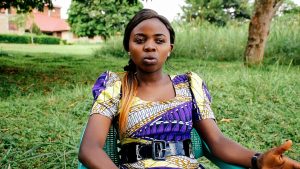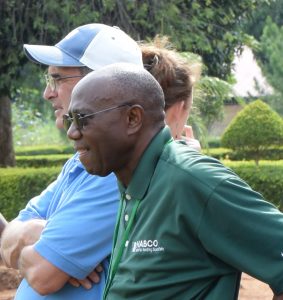 UCBC agribusiness student Hekima Kalumni played a key role in organizing the 2018 Women’s Voices conference centered on the theme, “Invest in the Transformational Leadership of Women.” Her extraordinary leadership encourages other female students to be bold in their educational pursuits and to recognize their strength as leaders, even if the world around them tries to tell them otherwise. For students like Kalumni, waiting on the world to change is not an option. Surrounded by a supportive community like Women’s Voices, she and other women in Congo know now is the time to discover their identity as leaders.
UCBC agribusiness student Hekima Kalumni played a key role in organizing the 2018 Women’s Voices conference centered on the theme, “Invest in the Transformational Leadership of Women.” Her extraordinary leadership encourages other female students to be bold in their educational pursuits and to recognize their strength as leaders, even if the world around them tries to tell them otherwise. For students like Kalumni, waiting on the world to change is not an option. Surrounded by a supportive community like Women’s Voices, she and other women in Congo know now is the time to discover their identity as leaders.
However, Hekima did not always have this confidence. Before coming to UCBC, she had “low self-esteem” and did not recognize her qualities and strengths. In her first year, Hekima began to recognize her potential as well as her role in leading transformation in Congo. She grew passionate about agribusiness and now wants to encourage others to pursue agricultural entrepreneurship. She witnessed older female students become leaders at UCBC, and eventually as alumni working in the wider community. And now, not only is she serving as a role model to younger students but as the second child of nine and the oldest daughter, Hekima is setting the stage for generations to come by attending a university and becoming a transformational leader.
“I have visions [for the future of Congo]. My long-term vision is to work towards the development of my country. My short-term vision is to encourage youth to be involved in agriculture entrepreneurship. I want to motivate farmers and create opportunities for them so they can sell their products,” Hekima explained.
In her first few years at UCBC, Hekima learned the important role women can play in leading agribusiness initiatives. She recognizes that “women have potential in various domains. But, in agriculture, UN studies show that with the same technological, financial, agriculture material conditions, women are 30% more productive than men. UNESCO has also shown that for an educated woman, her child has a 50% chance live beyond 5 years.”
For these reasons, investing in women’s education and agribusiness is critical for improving the livelihoods of women, children, and men in Congo. The good news, Hekima shared, is that “investment in women has already started; we can see it here at UCBC! I am among those who were selected for an agribusiness scholarship for women. For those who received this scholarship, it is time that we need to work hard and show people our potential.”


 Would you tell us a bit about your background?
Would you tell us a bit about your background? Tim: You know, Congo is a complex place for those of us who have spent time there. There is so much
Tim: You know, Congo is a complex place for those of us who have spent time there. There is so much